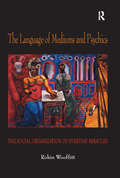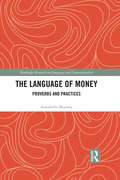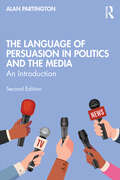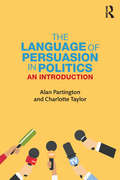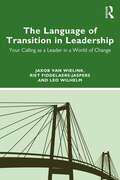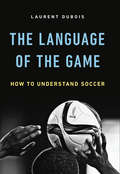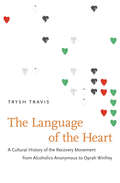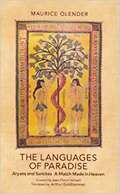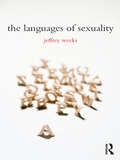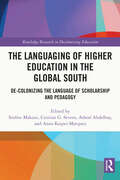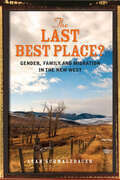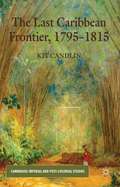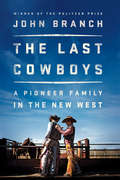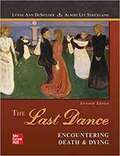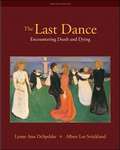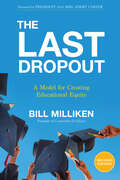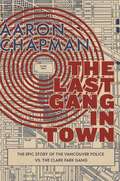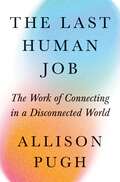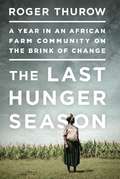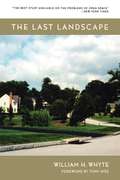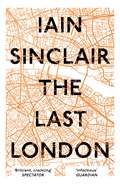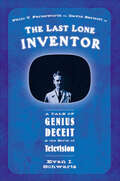- Table View
- List View
The Language of Mediums and Psychics: The Social Organization of Everyday Miracles
by Robin WooffittEvery week thousands of people in Europe and the USA consult psychic practitioners. Communication is crucial to the performance of psychic powers in a range of settings. Psychic practitioners use language to demonstrate their powers, whether they are reporting the words of their spirit contacts or interpreting the spread of Tarot cards. Their clients also accept or reject this information through talk. This book presents the first sustained study of the verbal interaction between the various kinds of psychic practitioners and their clients. Using conversation analysis, Robin Wooffitt examines the structure of the interaction, focusing on the ways in which psychic practitioners and their clients establish the authenticity of the claimed paranormal powers. Adopting a neutral standpoint towards the status of the claims of psychic practitioners, the book raises important issues about the role of social science in understanding the activities of psychic practitioners and other kinds of parapsychological phenomena. This highly original study will appeal to students and scholars of discourse studies, and to sociologists interested in conversation analysis. It is written in a style accessible to non-specialists, and will also interest parapsychologists and social scientists studying psychic phenomena and the paranormal.
The Language of Money: Proverbs and Practices (Routledge Research in Language and Communication)
by Annabelle MooneyThrough a detailed examination of proverbs related to money, this book offers a comprehensive critique of the prevailing everyday ideologies and discourses on money and paves the way toward establishing a new set of proverbs more conducive to financial equality and human well-being. The volume explores a variety of contexts to demonstrate the different aspects of the money system and the linguistic and social structures embedded within them, including pay day loan websites, gambling, get rich self-help books, and new forms of currency. Unpacking this complex relationship between people, money, and language in contemporary society, this book is an ideal resource for students and scholars in language and communication, sociolinguistics, rhetoric, sociology, and media studies.
The Language of Persuasion in Politics and the Media: An Introduction
by Alan PartingtonThis bestselling introductory textbook examines the relationship between politicians, the press and the public through the language they employ. Now fully revised with new material on delegitimisation, ‘fake news’, disinformation, (self-)censorship, ‘conspiracy theories’ and ‘Zombie’ narratives, key topics include:• Evaluation, the ‘engine’ of persuasion.• ‘Spin’, ‘spin control’ and ‘image’ politics.• Models of persuasion, including authority, contrast, problem-solution, association, ‘garden path.’• Pseudo-logical and ‘post-truth’ arguments.• Humour, irony and satire.• Metaphors: use, misuse and dangers.• Election rhetoric.Extracts from speeches, soundbites, newspapers and blogs, social media, interviews, press conferences, election slogans and satires are used to provide the reader with the tools to discover the beliefs, character and hidden strategies of the would-be persuader, as well as the counter-strategies of their targets. This book demonstrates how the study of language use can help us appreciate, exploit and protect ourselves from the art of persuasion.With a wide variety of practical examples, on both recent issues and historically significant ones, every topic is complemented with guiding tasks, queries and exercises, with keys and commentaries at the end of each unit. This highly original textbook is ideal for all introductory courses on language and politics, media language, rhetoric and persuasion, discourse studies and related areas.
The Language of Persuasion in Politics: An Introduction
by Charlotte Taylor Alan PartingtonThis accessible introductory textbook looks at the modern relationship between politicians, the press and the public through the language they employ, with extensive coverage of key topics including: ‘spin’, ‘spin control’ and ‘image’ politics models of persuasion: authority, contrast, association pseudo-logical and ‘post-truth’ arguments political interviewing: difficult questions, difficult answers metaphors and metonymy rhetorical figures humour, irony and satire Extracts from speeches, soundbites, newspapers and blogs, interviews, press conferences, election slogans, social media and satires are used to provide the reader with the tools to discover the beliefs, character and hidden strategies of the would-be persuader, as well as the counter-strategies of their targets. This book demonstrates how the study of language use can help us appreciate, exploit and protect ourselves from the art of persuasion. With a wide variety of practical examples on both recent issues and historically significant ones, every topic is complemented with guiding tasks, queries and exercises with keys and commentaries at the end of each unit. This is the ideal textbook for all introductory courses on language and politics, media language, rhetoric and persuasion, discourse studies and related areas.
The Language of Transition in Leadership: Your Calling as a Leader in a World of Change
by Jakob van Wielink Leo Wilhelm Riet Fiddelaers-JaspersIn this book, the authors utilise their decades of experience in leadership and coaching for change to help leaders develop the necessary skills to lead people and organisations in transition. Combining a scientific and practice-based approach, they show readers how to develop and maintain their own impactful leadership style while creating psychological safety in their teams. Leadership that achieves sustainable results comes from connecting past, present and future. Describing leadership as a journey, the book invites the reader to discover their calling and realise the importance of examining the roots of their leadership, before thinking about its destination. It gives leaders access to a new dimension of unprecedented growth and demonstrates the ways these lessons and skills can transform change into lasting transitions. Accessible and written in a lively style, The Language of Transition in Leadership is an important book for leaders and executives. It will also be of interest to coaches, organisational advisors, management consultants, students of leadership and those transitioning into the workforce.
The Language of the Game: How to Understand Soccer
by Laurent DuboisJust in time for the 2018 World Cup, a lively and lyrical guide to appreciating the drama of soccer Soccer is not only the world's most popular sport; it's also one of the most widely shared forms of global culture. The Language of the Game is a passionate and engaging introduction to soccer's history, tactics, and human drama. Profiling soccer's full cast of characters--goalies and position players, referees and managers, commentators and fans--historian and soccer scholar Laurent Dubois describes how the game's low scores, relentless motion, and spectacular individual performances combine to turn each match into a unique and unpredictable story. He also shows how soccer's global reach makes it an unparalleled theater for nationalism, international conflict, and human interconnectedness.Filled with perceptive insights and stories both legendary and little known, The Language of the Game is a rewarding read for anyone seeking to understand soccer better.
The Language of the Heart: A Cultural History of the Recovery Movement from Alcoholics Anonymous to Oprah Winfrey
by Trysh TravisInThe Language of the HeartTrysh Travis explores the rich cultural history of Alcoholics Anonymous (AA) and its offshoots and the larger "recovery movement" that has grown out of them. Moving from AA's beginnings in the mid-1930s as a men's fellowship that met in church basements to the thoroughly commercialized addiction treatment centers of today, Travis chronicles the development of recovery and examines its relationship to the broad American tradition of self-help, highlighting the roles that gender, mysticism, and print culture have played in that development. Travis draws on hitherto unexamined materials from AA's archives as well as a variety of popular recovery literatures. Her analysis traces AA's embrace of the concept of alcoholism as disease, the rise of feminist sobriety discourse and the codependence theories of the 1970s and 80s, and Oprah Winfrey's turn-of-the-millennium popularization of metaphysical healing. What unites these varied cultures of recovery, Travis argues, is their desire to offer spiritual solutions to problems of gender and power. Treating self-help seekers as individuals whose intellectual and aesthetic traditions are worth excavating,The Language of the Heartis the first book to attend to the evolution and variation found within the recovery movement and to treat recovery with the attention to detail that its complexity requires.
The Languages Of Paradise: Aryans And Semites A Match Made In Heaven
by Arthur Goldhammer Maurice OlenderMichel Foucault observed that "the birth of philology attracted far less notice in the Western mind than did the birth of biology or political economy." In this penetrating exploration of the origin of the discipline, Maurice Olender shows that philology left an indelible mark on Western visions of history, and contributed directly to some of the most horrifying ideologies of the twentieth century.
The Languages of Sexuality
by Jeffrey WeeksWords, Freud once wrote, are magic. Nowhere have words been more magical than in the writing of sexuality. Through words and concepts we learn what is good or bad, pleasurable or painful, significant and insignificant. The terms we use about sexuality do not simply describe something out there. They help shape what sexuality is. The Languages of Sexuality offers concise and incisive essays on key words and concepts which have played a significant role in shaping our understanding of contemporary sexualities and intimacies. Nearly a hundred essays illuminate the terms related to sexuality in fresh, and often unexpected ways, with entries ranging from ‘abjection’ and ‘abortion’ to ‘transgender and ‘Viagra’. Written with clarity, insight and passion by an internationally renowned theorist of sexuality, this book is not only an invaluable handbook, but also a personal exploration of the fluid, shifting, ever evolving meanings of sexual life as reflected and refracted through words and concepts. This book is an invaluable resource for both students and researchers with interests relating to sexuality and intimate life, gender studies, cultural studies, history and sociology. It will also appeal to a wider audience interested in critical debates about the nature and meanings of contemporary sexualities.
The Languages of the Jews
by Bernard SpolskyHistorical sociolinguistics is a comparatively new area of research, investigating difficult questions about language varieties and choices in speech and writing. Jewish historical sociolinguistics is rich in unanswered questions: when does a language become 'Jewish'? What was the origin of Yiddish? How much Hebrew did the average Jew know over the centuries? How was Hebrew re-established as a vernacular and a dominant language? This book explores these and other questions, and shows the extent of scholarly disagreement over the answers. It shows the value of adding a sociolinguistic perspective to issues commonly ignored in standard histories. A vivid commentary on Jewish survival and Jewish speech communities that will be enjoyed by the general reader, and is essential reading for students and researchers interested in the study of Middle Eastern languages, Jewish studies, and sociolinguistics.
The Languaging of Higher Education in the Global South: De-Colonizing the Language of Scholarship and Pedagogy (Routledge Research in Decolonizing Education)
by Sinfree Makoni Anna Kaiper-Marquez Cristine G. Severo Ashraf AbdelhayBy foregrounding language practices in educational settings, this timely volume offers a postcolonial critique of the languaging of higher education and considers how Southern Epistemologies can be used to further the decolonization of post-secondary education in the Global South. Offering a range of contributions from diverse and minoritized scholars based in countries including South Africa, Rwanda, Sudan, Qatar, Turkey, Portugal, Sweden, India and Brazil, The Languaging of Higher Education in the Global South problematizes the use of language in various areas of higher education. Chapters demonstrate both subtle and explicit ways in which the language of pedagogy, scholarship, policy, and partcipiation endorse and privelege Western constructs and knowledge production, and utilize Southern theories and epistemologies to offer an alternative ways forward – practice and research which applies and promotes Southern epistemologies and local knowledges. The volume confronts issues including integrationism, epistemic solidarity, language policy and ideology, multilingualism, and the increasing use of technology in institutions of higher education. This innovative book will be of interest to researchers, scholars, and postgraduate students in the fields of higher education, applied linguistics, and multicultural education. Those with an interest in the decolonization of education and language will find the book of particular use.
The Last Best Place? Gender, Family, and Migration in the New West
by Leah SchmalzbauerSouthwest Montana is beautiful country, evoking mythologies of freedom and escape long associated with the West. Partly because of its burgeoning presence in popular culture, film, and literature, including William Kittredge's anthology The Last Best Place, the scarcely populated region has witnessed an influx of wealthy, white migrants over the last few decades. But another, largely invisible and unstudied type of migration is also present. Though Mexican migrants have worked on Montana's ranches and farms since the 1920s, increasing numbers of migrant families—both documented and undocumented—are moving to the area to support its growing construction and service sectors. The Last Best Place? asks us to consider the multiple racial and class-related barriers that Mexican migrants must negotiate in the unique context of Montana's rural gentrification. These daily life struggles and inter-group power dynamics are deftly examined through extensive interviews and ethnography, as are the ways gender structures inequalities within migrant families and communities. But Leah Schmalzbauer's research extends even farther to highlight the power of place and demonstrate how Montana's geography and rurality intersect with race, class, gender, family, illegality, and transnationalism to affect migrants' well-being and aspirations. Though the New West is just one among many new destinations, it forces us to recognize that the geographic subjectivities and intricacies of these destinations must be taken into account to understand the full complexity of migrant life.
The Last Caribbean Frontier, 1795�1815
by Kit CandlinThe Southern Caribbean was the last frontier in the Atlantic world and the most contested region in the Caribbean during the Age of Revolution. As well as illuminating this little-understood region, the book seeks to complicate our understanding of the Caribbean, the role of 'free people of colour' and the nature of slavery.
The Last Cowboy
by Jane KramerPortrays the life of a man who strives to be "a proper cowboy" despite radical changes which have propelled the Old West into a New Southwest characterized by industrialized agribusiness.<P><P> 'The West that Henry mourned belonged to the Western movie, where the land and the cattle went to their proper guardians and brought a fortune in respect and power. It was a West where the best cowboy got to shoot the meanest outlaw, woo the prettiest schoolteacher, bed her briefly to produce sons, and then ignore her for the finer company of other cowboys - a West as sentimental and as brutal as the people who made a virtue of that curious combination of qualities and called it the American experience.' From the Introduction: Henry Blanton is the 'last cowboy' of Jane Kramer's classic portrait, the failed hero of his own mythology, the man who ends an era for himself. His story - his flawed, funny, and in the end tragic efforts to be a proper cowboy, 'expressin' right' in a world where the range is a feed yard and college boys run ranches from air-conditioned Buicks -is the story of a country coming of age in great promise and greater disappointment. A hundred and fifty miles up the highway from agri-business Amarillo, Henry claimed the extravagant prerogatives of a free man on a horse. He rode his own frontier, decked out in his vigilance and his honour, until the shocking moment when in the person of Henry Blanton the West and the Western had a showdown.<P> Winner of the National Book Award
The Last Cowboys: A Pioneer Family In The New West
by John BranchA gripping portrait of one family’s gamble that rodeo and ranching are the future of the West—and not just its past. For generations, the Wrights of southern Utah have raised cattle and world-champion saddle-bronc riders—some call them the most successful rodeo family in history. Now Bill and Evelyn Wright, parents to 13 children and grandparents to many more, find themselves struggling to hang on to the majestic landscape where they’ve been running cattle for 150 years as the West is transformed by urbanization, battered by drought, and rearranged by public-land disputes. Could rodeo, of all things, be the answer? In a powerful follow-up to his prize-winning, best-selling first book, New York Times reporter John Branch delivers an epic and intimate family story deep in the American grain. Written with great lyricism and filled with vivid scenes of ranch life and the high drama of saddle-bronc competition, The Last Cowboys chronicles three years in the life of the Wrights, each culminating in rodeo’s National Finals in Las Vegas. Will Bill and Evelyn be able to hold the family together as rodeo injuries pile up and one of their sons goes off on a religious mission? Will their son Cody, a two-time world champion, make it to the finals one last time—and compete with his own son? And will the younger generation—Rusty, Ryder, Stetson, and the rest—be able to continue the family’s ways in the future? This is a grand and compelling work of reporting that, like Buzz Bissinger’s Friday Night Lights, offers deep insight into American ritual and tradition. And in telling the Wright family’s story, from branding days to rodeo nights to annual Christmas gatherings, Branch captures something vital of the grit, determination, and integrity that fuel the American Dream. An unforgettable book by one of the finest reporters of our time, The Last Cowboys is a moving tribute to an American way of life.
The Last Dance: Encountering Death and Dying
by Albert Lee Strickland Lynne Ann DeSpelder Jeanette M. Potts Marion MasonThe Last Dance: Encountering Death and Dying provides a comprehensive, up to date, and readable introduction to the study of death and dying. It directs attention to the evolving understanding of death and dying in today's culturally diverse environment. In a straightforward, conversational style, with an extensively illustrated format, The Last Dance provides a solid grounding in theory and research as well as in methods for applying what is learned to readers' own circumstances, both personal and professional. No other textbook so successfully combines the research and theories of such diverse disciplines as anthropology, art, ethics, health science, literature, philosophy, psychology, public policy, religion, and sociology. The eleventh edition of The Last Dance includes coverage of key topics yet retains the focus, writing, and pedagogy instructors have come to expect from the best-selling text in death studies.
The Last Dance: Encountering Death and Dying (Ninth Edition)
by Albert Lee Strickland Lynne Ann DespelderThe best-selling textbook in its field, The Last Dance offers an interdisciplinary approach to the study of death and dying. Integrating the experiential, scholarly, social, individual, emotional, and intellectual dimensions of death and dying, this acclaimed text provides solid grounding in theory and research, as well as practical application to students' lives. The ninth edition has been updated to offer cutting-edge and comprehensive coverage of death studies.
The Last Dropout: A Model for Creating Educational Equity
by Bill MillikenA revised and updated edition of an exploration into the foundational principles, impact, and real-life success stories from Communities In Schools.Since 1977, Communities In Schools (CIS) has reached more than one million students and their families annually approximately 3,000 American schools, surrounding them with a community of support and empowering them to stay in school and achieve in life.In The Last Dropout, CIS founder Bill Milliken offers nine key principles that Communities In Schools has tested over four decades. Interwoven are his real-world life stories, a journey that began in the turbulent 1960s as a youth worker and evolved into a handful of groundbreaking "Street Academies" that became the CIS movement with a national network of hundreds of local affiliates. Milliken also shares transformative stories about how CIS leaders have adopted these principles in their own communities, with stunning results.Milliken's guiding philosophy has been "It is relationships, not programs, that change children," and it is a principle that has served as a beacon in the movement for educational equity and success.
The Last Gang in Town
by Aaron ChapmanDecades before organized crime syndicates brought sensational drug wars to Vancouver, street gangs held sway over its unruly east side. None was considered tougher or more feared than the Clark Park gang, a wild, two-fisted crew of characters from Vancouver's post-1960s counterculture. In 1972, after a number of headline-making riots and clashes with police―including an infamous altercation outside a Rolling Stones concert―the Clark Parkers became the target of a secret undercover police squad. Their hostile interactions culminated in a notorious police shooting, resulting in the death of a Clark Park gang member. Combining meticulous research with a keen flair for storytelling, The Last Gang in Town features previously unpublished photos and police documents, as well as testimonials by surviving gang members and police officers who speak for the first time on the subject. The book is a compelling portrait of early-1970s Vancouver and an intriguing and sensational history that puts the spotlight on the after-dark underbelly of the city's not-so-distant criminal past.
The Last Great War
by Adrian GregoryWhat was it that the British people believed they were fighting for in 1914–18? This compelling history of the British home front during the First World War offers an entirely new account of how British society understood and endured the war. Drawing on official archives, memoirs, diaries and letters, Adrian Gregory sheds new light on the public reaction to the war, examining the role of propaganda and rumour in fostering patriotism and hatred of the enemy. He shows the importance of the ethic of volunteerism and the rhetoric of sacrifice in debates over where the burdens of war should fall as well as the influence of religious ideas on wartime culture. As the war drew to a climax and tensions about the distribution of sacrifices threatened to tear society apart, he shows how victory and the processes of commemoration helped create a fiction of a society united in grief.
The Last Human Job: The Work of Connecting in a Disconnected World
by Allison J. PughA timely and urgent argument for preserving the work that connects us in the age of automationWith the rapid development of artificial intelligence and labor-saving technologies like self-checkouts and automated factories, the future of work has never been more uncertain, and even jobs requiring high levels of human interaction are no longer safe. The Last Human Job explores the human connections that underlie our work, arguing that what people do for each other in these settings is valuable and worth preserving.Drawing on in-depth interviews and observations with people in a broad range of professions—from physicians, teachers, and coaches to chaplains, therapists, caregivers, and hairdressers—Allison Pugh develops the concept of &“connective labor,&” a kind of work that relies on empathy, the spontaneity of human contact, and a mutual recognition of each other&’s humanity. The threats to connective labor are not only those posed by advances in AI or apps; Pugh demonstrates how profit-driven campaigns imposing industrial logic shrink the time for workers to connect, enforce new priorities of data and metrics, and introduce standardized practices that hinder our ability to truly see each other. She concludes with profiles of organizations where connective labor thrives, offering practical steps for building a social architecture that works.Vividly illustrating how connective labor enriches the lives of individuals and binds our communities together, The Last Human Job is a compelling argument for us to recognize, value, and protect humane work in an increasingly automated and disconnected world.
The Last Hunger Season
by Roger ThurowAt 4:00 am, Leonida Wanyama lit a lantern in her house made of sticks and mud. She was up long before the sun to begin her farm work, as usual. But this would be no ordinary day, this second Friday of the new year. This was the day Leonida and a group of smallholder farmers in western Kenya would begin their exodus, as she said, “from misery to Canaan,” the land of milk and honey. Africa’s smallholder farmers, most of whom are women, know misery. They toil in a time warp, living and working essentially as their forebears did a century ago. With tired seeds, meager soil nutrition, primitive storage facilities, wretched roads, and no capital or credit, they harvest less than one-quarter the yields of Western farmers. The romantic ideal of African farmers––rural villagers in touch with nature, tending bucolic fields––is in reality a horror scene of malnourished children, backbreaking manual work, and profound hopelessness. Growing food is their driving preoccupation, and still they don’t have enough to feed their families throughout the year. Thewanjala––the annual hunger season that can stretch from one month to as many as eight or nine––abides. But in January 2011, Leonida and her neighbors came together and took the enormous risk of trying to change their lives. Award-winning author and world hunger activist Roger Thurow spent a year with four of them––Leonida Wanyama, Rasoa Wasike, Francis Mamati, and Zipporah Biketi––to intimately chronicle their efforts. InThe Last Hunger Season,he illuminates the profound challenges these farmers and their families face, and follows them through the seasons to see whether, with a little bit of help from a new social enterprise organization called One Acre Fund, they might transcend lives of dire poverty and hunger. The daily dramas of the farmers’ lives unfold against the backdrop of a looming global challenge: to feed a growing population, world food production must nearly double by 2050. If these farmers succeed, so might we all.
The Last Landscape
by William H. Whyte Tony HissThe remaining corner of an old farm, unclaimed by developers. The brook squeezed between housing plans. Abandoned railroad lines. The stand of woods along an expanded highway. These are the outposts of what was once a larger pattern of forests and farms, the "last landscape." According to William H. Whyte, the place to work out the problems of our metropolitan areas is within those areas, not outside them. The age of unchecked expansion without consequence is over, but where there is waste and neglect there is opportunity. Our cities and suburbs are not jammed; they just look that way. There are in fact plenty of ways to use this existing space to the benefit of the community, and The Last Landscape provides a practical and timeless framework for making informed decisions about its use. Called "the best study available on the problems of open space" by the New York Times when it first appeared in 1968, The Last Landscape introduced many cornerstone ideas for land conservation, urging all of us to make better use of the land that has survived amid suburban sprawl. Whyte's pioneering work on easements led to the passage of major open space statutes in many states, and his argument for using and linking green spaces, however small the areas may be, is a recommendation that has more currency today than ever before.
The Last London: True Fictions from an Unreal City
by Iain SinclairA New Statesman Book of the Year London. A city apart. Inimitable. Or so it once seemed. Spiralling from the outer limits of the Overground to the pinnacle of the Shard, Iain Sinclair encounters a metropolis stretched beyond recognition. The vestiges of secret tunnels, the ghosts of saints and lost poets lie buried by developments, the cycling revolution and Brexit. An electrifying final odyssey, The Last London is an unforgettable vision of the Big Smoke before it disappears into the air of memory.
The Last Lone Inventor: A Tale of Genius, Deceit, and the Birth of Television
by Evan I. Schwartz“…Fascinating… A riveting American classic of independent brilliance versus corporate arrogance. I found it more fun than fiction.” — James Bradley, author of Flags of Our Fathers“… The fascinating inside story of how this eccentric loner invented television and fought corporate America.” — Walter Isaacson, chariman, CNN“…Compelling…Strong, dramatic prose…” — Kirkus Reviews“…A lively and engaging account.” — Library Journal“[A] gripping and eminently readable saga of the birth of television and the death of the Edisonian myth.” — Darwin magazine
